
The Telecom Regulatory Authority of India (TRAI) will be helping the Department of Telecommunications (DoT) in coming up with the norms that need to come into place to regulate the satellite broadband companies. The telecom department has asked the sector regulator to unveil a comprehensive discussion paper that will focus on creating a new licensing framework for the low earth orbit (LEO) operators. As per an ET Telecom report, TRAI will also be seeking to provide recommendations of which spectrum bands should be provided to the satellite broadband companies for offering services.
TRAI to Suggest Whether New Licenses Are Required or Not
TRAI, through its comprehensive discussion paper, will seek to understand whether a new category of licenses will be required or the satellite broadband companies can work with the existing licenses.
As per the report, through the discussion paper, TRAI will also seek views on the spectrum bands that need to be provided to the satellite broadband companies. It is only a short period left before global companies such as Starlink and OneWeb will start providing services in India.
In addition to these two companies, Amazon’s Project Juniper is also looking to enter the Indian market to provide satellite broadband services through LEO satellites.
OneWeb believes that ‘Q’ and ‘V’ bands will be very important for providing satellite broadband services in the country. The Q and V bands are typically the mmWave spectrum bands which come in the 33-75 GHz band.
Looking at the current satcom policies, a VSAT company needs approval from the Department of Space (DoS) to establish satellite earth station gateways in India. The companies won’t get any separate license only to establish gateway operations alone because it is a part of the VSAT license.
As per a senior industry executive, the government and the regulator should seek to simplify and widen the scope of the existing satcom licenses. This is because if there are new licenses created, it will create new restrictions for the industry, which would result in delays and slow growth for the companies.
It will be interesting to see what rules the government comes up with for the satellite broadband companies. Both OneWeb and Starlink plan to provide services in 2022 in India, which means the government needs to decide fast on the policies.















